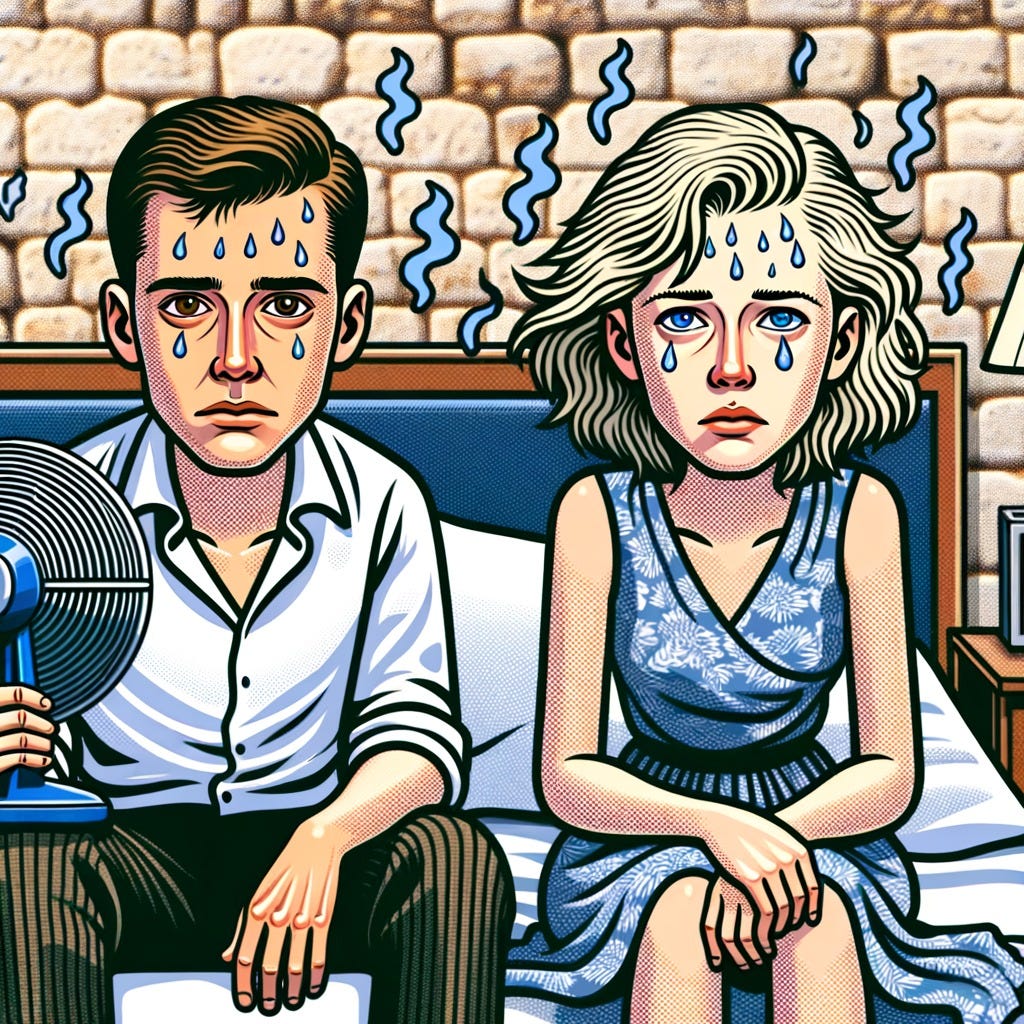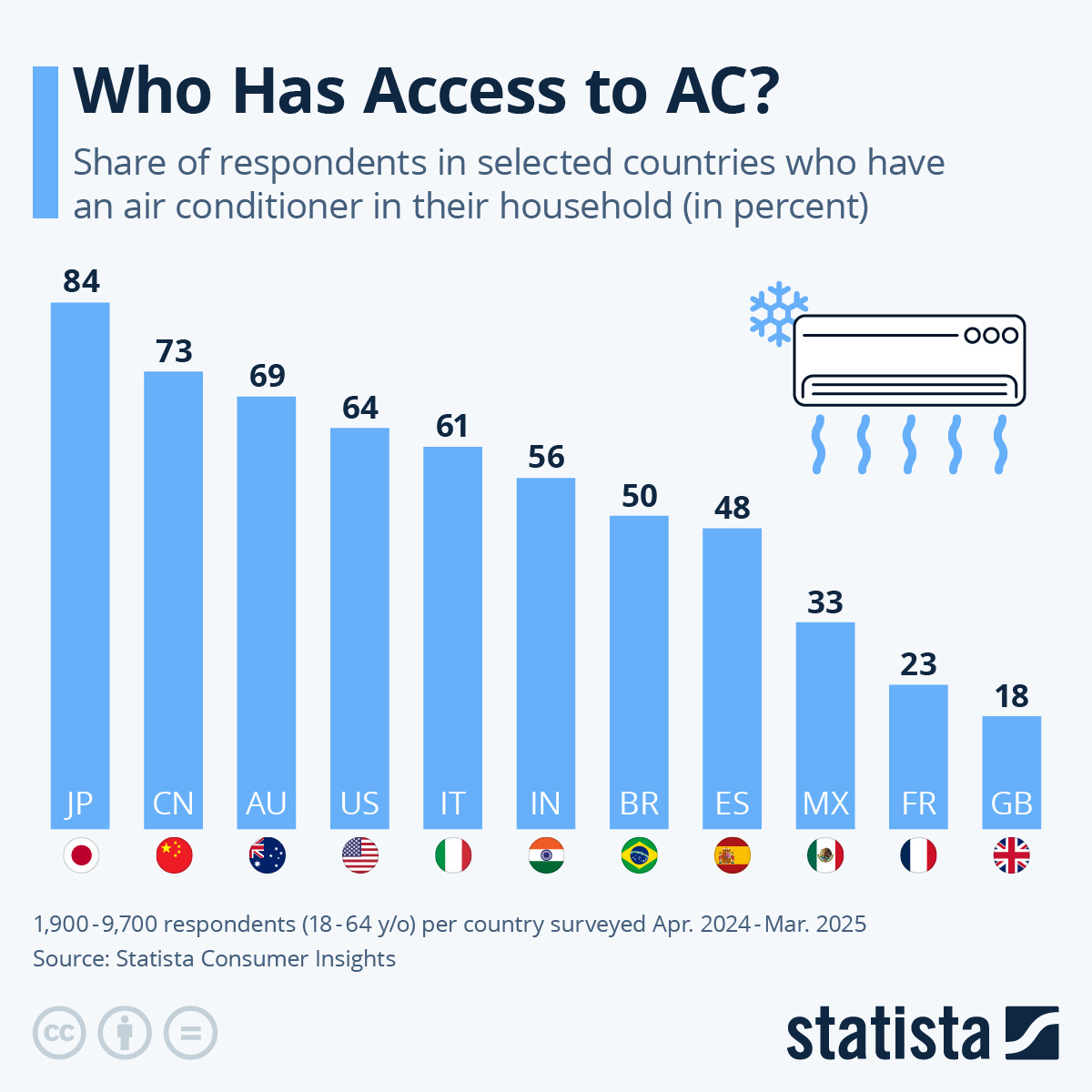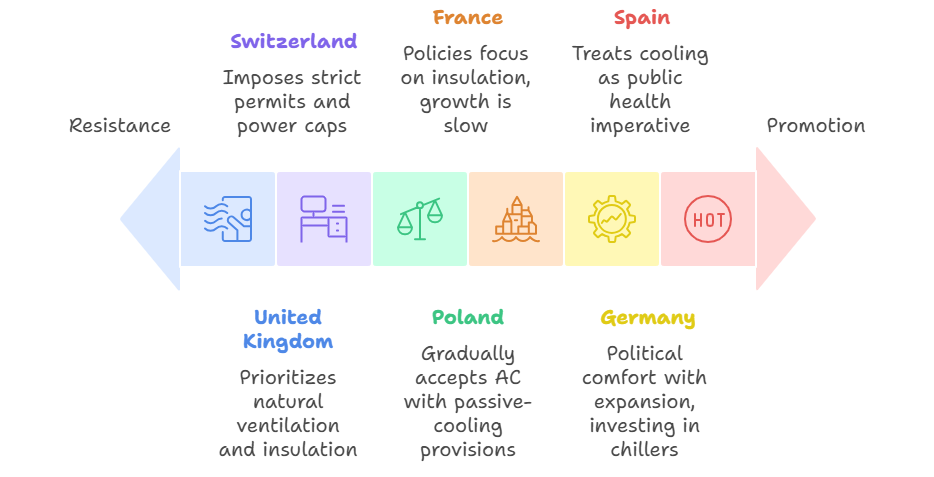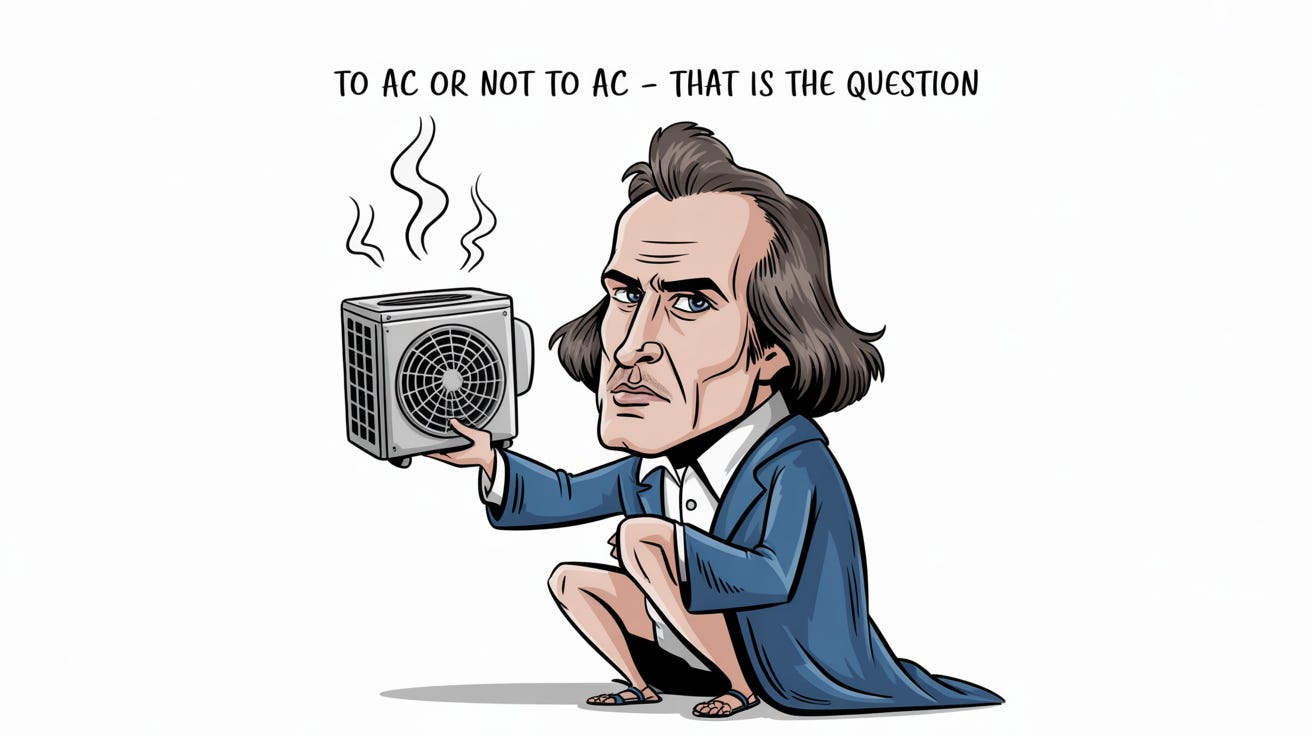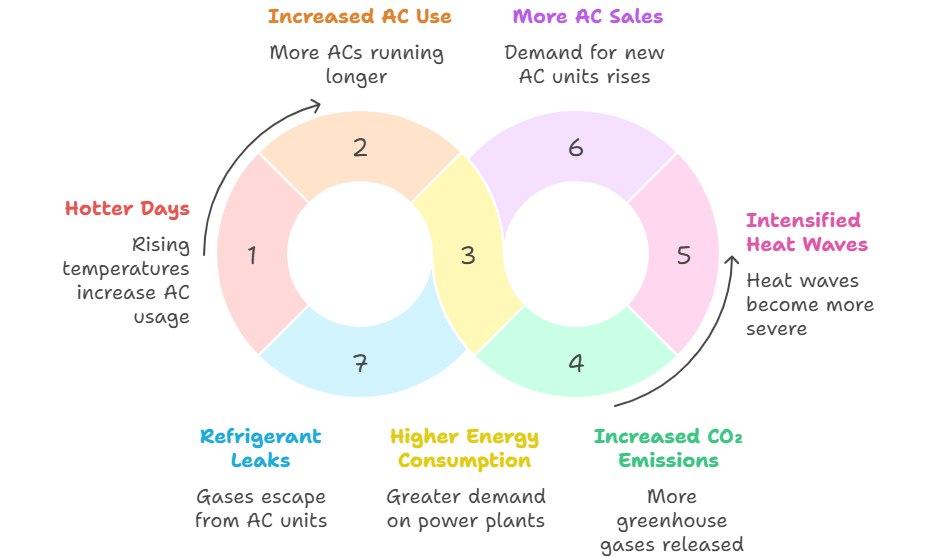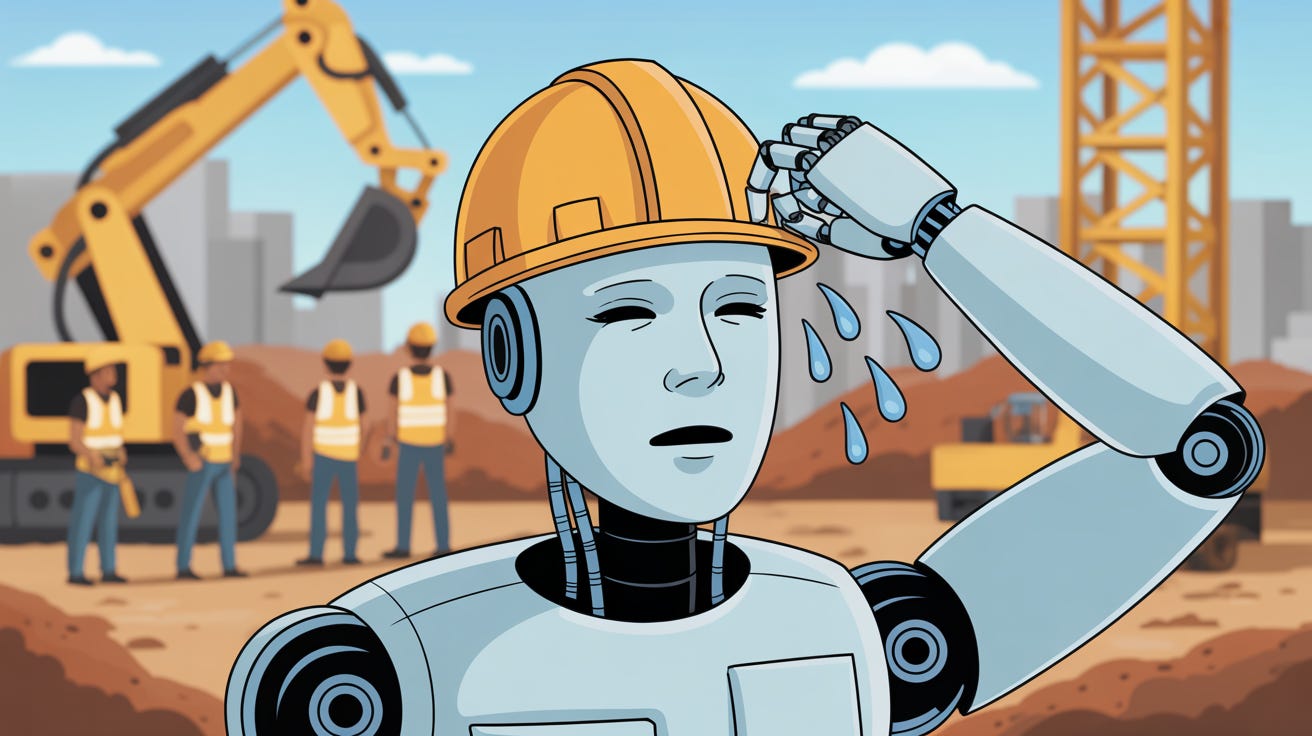Europe's Battle with Air Cons Ruined My Vacation. Guess What Will Happen to Yours
Air conditioners are Europe's inner demon: Damned if they do, damned if they don't
Climate change is reshaping power, money and markets. I help you stay on top of it!
Hey there👋
In this edition:
How Extreme Heat and no ACs Ruined my UK Vacation
Why ACs Are the Continent’s New Villain
How France Went to (Cultural) War Over Air Conditioners
How the EU is planning on breaking the AC vicious Cycle
You should read this if you’re…
Planning on a cool European vacation anytime from now till the end of time
Living or working in Europe
Looking for opportunities to buy and sell ACs
Before we continue - if you like my writing and memes, please subscribe to show me the love and force me to write more:
My wife and I traveled to the UK in 2021. We somehow managed to get past all of the crazy travel restrictions wrought down upon us by COVID-19 and took a few weeks to travel in the Cotswolds in July. Coming from a hot country, we have always used Europe as a getaway from the crushing heat of the Middle East.
Boy, were we wrong this time… 🥵🤦
Toward the end of our trip we stayed on the top floor of a 500-year-old pub, and were unfortunate to be caught in a heatwave. Heatwaves are a common feature of where we live, but we have more air conditioners (“ACs” from now on) than people, so we somehow get by.
But not in the UK. Oh, no, they don’t have ACs literally anywhere (well, maybe in office buildings, but I was trying to stay away from those).
We will not easily forget the intense heatwave we had the misfortune of being a part of: Staying in felt like being baked in a brick oven. We couldn’t focus, function or tear ourselves away from a makeshift fan. Sleep was elusive, the mood was foul, and the sweat was effusive. I kept on looking for the AC, but there was none. Definitely not the holiday I had in mind. ACs are now a core feature that we look for when staying in places (at least, that I look for. That and a pool).
Little did I realize then that I had experienced the precursor to a cultural, economic and climactic Reconfiguration. I always thought of myself as a documentarian, not a participant. But there I was, in the sweltering heat, caught in the hands of Europe’s greatest nemesis: ACs.
So, what’s the deal with ACs and Europe, you ask? Let’s take a look.
1. Europe Doesn’t Like ACs
Europe doesn’t like ACs.
If you’ve been at a bed & breakfast in most European countries, it’s likely you haven’t been able to find a mounted cooler anywhere.
Europe is notoriously known for its low penetration of ACs. Even though AC penetration has doubled since the 1990s, it still remains at a low 20%, while in countries like the US, over 90% of all buildings have ACs.
The 20% figure quoted above is only an average. For some countries, we’re talking about 5% (UK) and even 3% (Germany). Yeah, it’s that bad.
Traditionally, Europe has snubbed at ACs, touting a power mix of cultural heritage and historical reasons, environmental and economic concerns and, perhaps, a desire to show they are different from Americans. On its own, aversion to ACs is a cultural twist at best (and in my opinion kind of makes sense).
But, as climate change is taking sending more heat waves towards Europe, the continent’s aversion to ACs has become a liability, leading to excess deaths.
And still, not everyone in Europe think that ACs are a good idea, serving as fertile ground for yet another cultural war and place ACs at the heart of the continent’s fight against emissions.
2. AC vs. DC
Low AC penetration rates are nothing new, but with each passing summer, the need to increase the usage of ACs becomes more and more straightforward. The results of lack of ACs in Europe are pretty clear and stark:
Excess Deaths: ~62,000 preventable, excess deaths took place as a result of summer heatwaves in 2022; It is estimated that risk of death in southern Europe is 2-4x higher than in the US.
Lost Productivity: Extreme heat can cost 0.3–0.5% of European GDP in any given heatwave, impacting manual and outdoor workers
Grid Stress and Blackouts: Europe’s heatwaves sent power demand soaring, up to 14% in Spain, and triggering blackouts in Italian cities, surging energy bills, and leaving thousands without electricity during the hottest days.
With the growing frequency of heatwaves, it seems almost insane not to install more ACs. And yet, it doesn’t look like Europe is gung-ho on ACs. Like with anything in Europe, approaches vary:
Some countries keep on resisting, putting severe restrictions on AC installation (UK, Sweden, Finland), while others use red tape and cultural pushback (Switzerland)
Some countries provide a more pragmatic approach to ACs and rapidly increasing capacity (Germany, Greece, Italy)
Some countries are trying to pursue alternatives to ACs, focusing on insulation and heating efficiency (mostly in Eastern Europe)
Different European countries have different approaches to ACs. And then there’s France.
3. Le Harbinger
Gotta admit: It was the French that made me write this segment. Just recently, French politician Marine Le Pen made headlines as she called the current levels of AC usage “totally absurd”, promising to install ACs all over France if elected President. Of course, Le Pen couldn’t help herself and blamed lefties and elites for the situation. Classic.
The Green Party couldn’t help itself either, with leader Marine Tondelier calling for other solutions and stating that “the real problem is poor insulation”.
This recent exchange is a part of a much bigger tug-of-war regarding ACs:
In the left corner, we have climate advocates and left-leaning institutions that are arguing that ACs are an aberration and will only worsen climate change.
In the right corner, we have the far right parties, conservatives and an assortment of organizations that view ACs as a necessity that are a key to dealing with heat waves.
The irony of the far right’s position is that it traditionally abhors climate change related arguments, but advocate for ACs that are needed… as a result of climate change.
At any rate, both sides kind of have a point.
Before we dive into the impossible choices around ACs, its worth exploring this particular dynamic, as it is emblematic of Europe’s overall dilemma: Go HAM and risk backlash, or stay the course and slowly bake in the sweltering heat. And ACs are just the beginning.
As climate change intensifies, it creates contradictory, confusing, and often paradoxical shifts that tend to supercharge mundane issues with political flavor. The reason is that climate change tends to shift the basic assumptions of every day lives and changes the relationship we have with the broader environments. These shifts are met with cultural, political and even personal realities that do not always align with what seems most sensible.
In this case, what is even sensible? The answer, as we’ll shortly explore, isn’t obvious. What is obvious is that this kind of political debates over topics that didn’t matter a little while ago will only become more frequent.
4. No Easy Way Out
So what is the sensible solution here? More ACs or less?
The answer almost doesn’t matter. Each approach can have a terrible cost:
Not installing ACs can lead to continued excess deaths and can make life in some countries unbearable. By 2050, the French agency for ecological transition argues, most buildings in France will not be ready for the predicted temperatures. That is an ominous sign for life in France.
On the other hand, supercharging AC installation will likely only accelerate climate change. Yes, majority of energy in France is of Nuclear origins. But, impacts of ACs are not limited to energy consumption, but also to the release of toxic refrigerants and more.
France is not the only country that will face this dilemma. In fact, the majority of European countries will have to choose: To AC or not to AC.
ACs pose the risk of a vicious cycle, in which the increased use of ACs will only upend the climate even more, increasing the need for more cooling, which will require more ACs and on and on:
5. Is There a Third Way?
The EU thinks so. There are a number of initiatives designed to break the cycle. Instead of being stuck in between two bad choices, the EU is trying to find ways to cool the continent without further ruining the planet.
These initiatives can be classified into a few categories:
Supporting New Technologies: Funding of next gen cooling systems and investing in alternatives for current hazardous refrigerants through Europe’s flagship programs, including Horizon.
Knowledge Hubs and Awareness Campaigns: CoolLIFE is one prominent example, designed to “develop open-source tools which encourage the consideration of green cooling solutions”.
Policy and Regulatory Action: Phasing down harmful refrigerants and creating new building codes to promote cooling by design.
Market Incentives: Providing grants and incentives for cooling upgrades and adoption of energy-efficient cooling technologies.
Breaking free from the AC vicious cycle will probably need an “all of the above” approach and will require installing better, more advanced ACs, while promoting alternative cooling solutions.
Europe has hard choices ahead, but also a path to break the cycle, and it should think about both the short and long term, if it wants to make the continent livable, workable and tourist-y in the future.
6. Ok… Who Cares?
I know you’re expecting the regular “investors should…” and other generic call outs. But this one is something every one who plans on setting foot on the continent should really care about.
Here are a few of them:
Tourists: If you’re planning on a vacation in Europe, there’s an increasing likelihood this trip won’t be a chance to cool down and relax, but rather an exercise in slow-cooking. In fact, it’s already happening today. Extreme heat is already changing travel habits, and my own experience in the UK was only a start.
Every Day Life: If you live in the continent, you don’t get to fly away to your AC-cushioned country. You’re stuck with the blazing heat, and it’s only going to get worse.
Businesses: If your business relies on outside activities or work, be prepared for a much harder operating environment. Productivity is likely to drop as extreme heat rises, and you will be stuck with the operating losses. What can you do about it? Not much. Normally I’d say bring on the robots, but they are also not immune to heat spells.
Unlike many topics we usually explore, in this case there is plenty to do: Businesses, investors, policymakers and even individuals should keep on talking about this problem, and come up with new solutions to move away from the current way of framing the debate.
Will it happen? I guess I’ll find out on my next visit!
That’s it for this week.
This Saturday I’m on vacation. This time for real. We will resume our usual shenanigans the week after.
Don’t forget to subscribe 🔽
And if you have any comments, thoughts or suggestions, I’d love to hear from you in the comments (I also need the traffic 🤷♂️)




